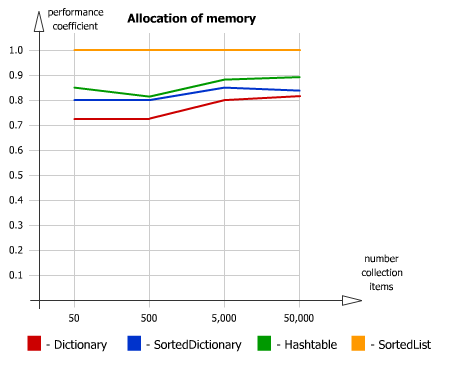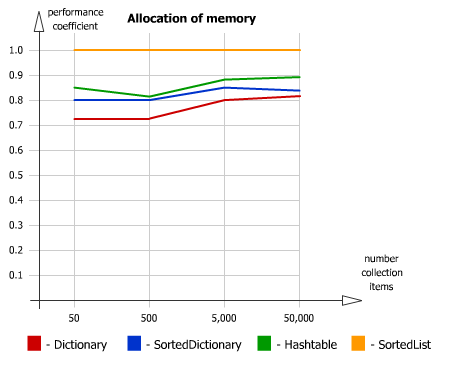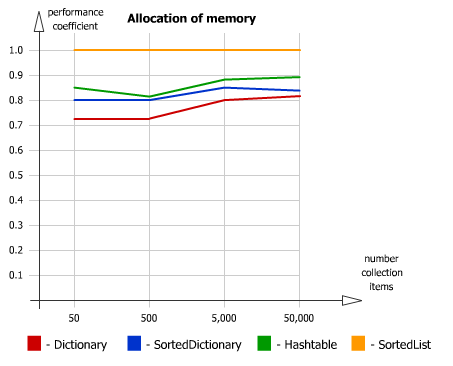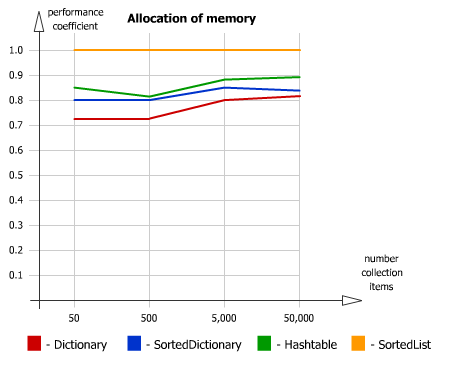Please note that the advantage of Hashtable over generic Dictionary for insert and
search operations demonstrated here is actually because the tests are based on NON
generic IDictionary interface, so each insert or search action is accompanied with
check for the key type. For more information see the Sean's comment below. (Thanks
Sean!) Without that Dictionary seem to perform better than the Hashtable. The rest
of the test conclusions will not be affected. So to summarize, generic Dictionary
is the absolute winner for insert and search operations if used with generic dictionary
interface or directly.
This is a sequence of tests comparing the performance results for four different
implementations of IDictionary and in particular generic Dictionary, generic SortedDictionary,
the old non-generic Hashtable and generic SortedList.I performed several tests, comparing the following parameters: memory used in bytes, time for the insertion in ticks, time for the item search in ticks, and the time for looping with foreach in ticks. The test was performed 8000 times for all the four implementation, and the order was random so each implementation has been tested at least 1000 times. I performed the tests in five stages, to observe the relationship between the number of entries and the performance. In the first stage the collections had 50 items, in the second 500, in the third 5,000 in the fourth 50,000 items. In this particular test, lower numbers of memory usage or time taken for the execution means better performance. So if we want to present visually a performance chart for each of the parameters we have to deduce a performance coefficient from the raw data. I have used the following code to calculate the performance coefficient:
Performance Coefficient
for value x = min(value 1, value 2, … value n) / value x
This way, because the best performing value is the lowest one it will be transformed
as value 1 of the performance coefficient and any other value will be a fraction
of that value.
This is the chart of the memory usage: 
This is the chart for the time taken for insert operations: 
This is the chart for the time taken for search operations: 
This is the chart for the time taken for for-each collection loop operations: 
Here you can see the task manager during the test it shows us a picture of the memory usage. Area A is during the insertion phase when more and more memory has been allocating. Area B is from the end of the insertion until the garbage collection of the object. 
using System; using System.Collections; using System.Collections.Generic; using System.Diagnostics; /* to compile enter in the command prompt: C:\WINDOWS\Microsoft.NET\Framework\v2.0.50727\csc IDictTest.cs to run enter in the command prompt: IDictTest */ namespace IDictTest{ public class RunResult{ public decimal MemoryUsed; public decimal InsertTicks; public decimal SearchTicks; public decimal ForEachTicks; } public class Program { private static int SearchIndex = 27; //private const int NumberInsertedKeys = 50; //private const int NumberInsertedKeys = 500; //private const int NumberInsertedKeys = 5000; private const int NumberInsertedKeys = 50000; //private const int NumberInsertedKeys = 100000; private const int NumberTests = 8000; private static readonly string[] Letters = {"A","B","C","D","E","F","G","H","I","J"}; public static void Main(string[] args) { try{ // TRY STARTS HERE ---------- List<RunResult> listDictionary = new List<RunResult>(); List<RunResult> listSortedDictionary = new List<RunResult>(); List<RunResult> listHashtable = new List<RunResult>(); List<RunResult> listSorderList = new List<RunResult>(); Stopwatch watch = Stopwatch.StartNew(); for(int i = 0; i < NumberTests; i++){ SearchIndex += 1; Random rand = new Random(); int randInt = rand.Next(0, 4); if(randInt == 0){ listDictionary.Add( Test("Dictionary", new Dictionary<string, string>(), i)); }else if(randInt == 1){ listSortedDictionary.Add( Test("SortedDictionary", new SortedDictionary<string, string>(), i)); }else if(randInt == 2){ listHashtable.Add( Test("Hashtable", new Hashtable(), i)); }else if(randInt == 3){ listSorderList.Add( Test("SortedList", new SortedList(), i)); } } Console.Clear(); Msg("Time taken (minutes): {0} or about {1} minutes and {2} seconds", watch.Elapsed.TotalMinutes, watch.Elapsed.Minutes, watch.Elapsed.Seconds); RunResult resultDict = CalculateAvg(listDictionary); RunResult resultSortDict = CalculateAvg(listSortedDictionary); RunResult resultHash = CalculateAvg(listHashtable); RunResult resultSortList = CalculateAvg(listSorderList); RunResult min = new RunResult{ MemoryUsed = Math.Min(Math.Min(Math.Min(resultDict.MemoryUsed, resultSortDict.MemoryUsed),resultHash.MemoryUsed),resultSortList.MemoryUsed), InsertTicks = Math.Min(Math.Min(Math.Min(resultDict.InsertTicks, resultSortDict.InsertTicks), resultHash.InsertTicks), resultSortList.InsertTicks), SearchTicks = Math.Min(Math.Min(Math.Min(resultDict.SearchTicks, resultSortDict.SearchTicks), resultHash.SearchTicks), resultSortList.SearchTicks), ForEachTicks = Math.Min(Math.Min(Math.Min(resultDict.ForEachTicks, resultSortDict.ForEachTicks), resultHash.ForEachTicks), resultSortList.ForEachTicks) }; // print the results PrintResults(resultDict, listDictionary.Count, min, "Dictionary"); PrintResults(resultSortDict, listDictionary.Count, min, "SortedDictionary"); PrintResults(resultHash, listDictionary.Count, min, "Hashtable"); PrintResults(resultSortList, listDictionary.Count, min, "SortedList"); // TRY ENDS HERE ---------- }catch(Exception ex){ Msg("{0}", ex); } } private static RunResult CalculateAvg(List<RunResult> list){ decimal sumMemory = 0; decimal sumInsert = 0; decimal sumSearch = 0; decimal sumForEach = 0; for(int i = 0; i < list.Count; i++){ RunResult curr = list[i]; sumMemory += curr.MemoryUsed; sumInsert += curr.InsertTicks; sumSearch += curr.SearchTicks; sumForEach += curr.ForEachTicks; // uncomment to print each line //Msg("{0,11} {1,13} {2,14}", //curr.MemoryUsed, curr.InsertTicks, curr.SearchTicks); } return new RunResult{ MemoryUsed = sumMemory / list.Count, InsertTicks = sumInsert / list.Count, SearchTicks = sumSearch / list.Count, ForEachTicks = sumForEach / list.Count, }; } private static void PrintResults(RunResult result, int count, RunResult min, string name){ Msg("--------- Results for {0}", name); Msg("# Tests {0}", count); Msg("Memory Used Insert Ticks Search Ticks ForEach Ticks"); Msg("Average Values:"); Msg("{0,11:N} {1,13:N} {2,14:N} {3,14:N}", result.MemoryUsed, result.InsertTicks, result.SearchTicks, result.ForEachTicks); Msg("Performance Coefficient:"); Msg("{0,11:N} {1,13:N} {2,14:N} {3,14:N}", min.MemoryUsed/result.MemoryUsed, min.InsertTicks/result.InsertTicks, min.SearchTicks/result.SearchTicks, min.ForEachTicks/result.ForEachTicks); Msg(""); } private static void Msg(string name, params object[] args){ Console.WriteLine(name, args); } private static RunResult Test(string name, IDictionary dict, int n){ Console.Clear(); Msg("Currently executing test {1} of {2} for {0} object", name, n + 1, NumberTests); RunResult rr = new RunResult(); Stopwatch watch; Random rand = new Random( ); long memoryStart = System.GC.GetTotalMemory(true); long insertTicksSum = 0; for(int i = 0; i < NumberInsertedKeys; i++){ string key = GetRandomLetter(rand, i)+"_key"+i; string value = "value"+i; watch = Stopwatch.StartNew(); dict.Add(key, value); watch.Stop(); insertTicksSum += watch.ElapsedTicks; } rr.MemoryUsed = System.GC.GetTotalMemory(true) - memoryStart; rr.InsertTicks = insertTicksSum; watch = Stopwatch.StartNew(); object searchResult = dict["C_key"+SearchIndex]; watch.Stop(); rr.SearchTicks = watch.ElapsedTicks; watch = Stopwatch.StartNew(); foreach(var curr in dict){} watch.Stop(); rr.ForEachTicks = watch.ElapsedTicks; return rr; } private static string GetRandomLetter(Random rand, int i){ if(i == SearchIndex){ return "C"; } return Letters[rand.Next(0, 10)]; } } }The computer used for the test has the following characteristics: Processor: Intel(R) Core(TM)2 Duo CPU T7300 @ 2.00GHz 2.GHz Memory (RAM): 2.00 GB System type: 32-bit Operating System Windows VistaThese is the raw data. Memory Used is in bytes and the insert, search and looping time in ticks: Time taken (minutes): 0.324318411666667 or about 0 minutes and 19 seconds --------- Results for Dictionary # Tests 2063 Memory Used Insert Ticks Search Ticks ForEach Ticks Average Values: 4,748.48 3,019.60 126.40 198.21 Performance Coefficient: 0.73 0.92 0.83 0.80 --------- Results for SortedDictionary # Tests 2063 Memory Used Insert Ticks Search Ticks ForEach Ticks Average Values: 4,345.04 5,000.54 193.05 377.99 Performance Coefficient: 0.80 0.55 0.55 0.42 --------- Results for Hashtable # Tests 2063 Memory Used Insert Ticks Search Ticks ForEach Ticks Average Values: 4,096.38 2,775.27 105.36 209.91 Performance Coefficient: 0.85 1.00 1.00 0.75 --------- Results for SortedList # Tests 2063 Memory Used Insert Ticks Search Ticks ForEach Ticks Average Values: 3,488.50 4,350.48 167.89 158.41 Performance Coefficient: 1.00 0.64 0.63 1.00 |
Blog thats gives totally information like tricks,webs,codes,news, etc
Total Pageviews
Subscribe Latest Updates
Search
Blog Archive
Popular Posts
-
Disclaimer : Some Short Form Definitions May Have Swearing And Or Other Types Of Course Or Offensive Language A A3 – Anytime, anywh...
-
It is becoming increasingly important for any application that works with dates and times to handle differences between time zones. An a...
-
Remote Desktop Connection Manager (Multi RDP Client) Remote Desktop Services is one of Microsoft Windows components to access a ...
-
Whatsapp is a very famous instant messenger which was used by many smartphone users. Whatsapp is developing with many features and comf...
-
The finest protection against any sort of security threat is to have a complete up-to-date backup of your contact,video,site,etc. Taking b...
© 2013 Totaly Info All Rights Reserved.





0 comments:
Post a Comment